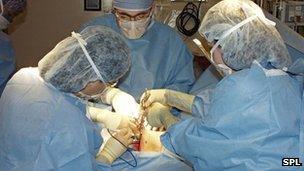Strikes: NHS hospitals 'prioritising urgent patients'
- Published

Nearly a quarter of operations are thought to have been cancelled
Hospitals cancelled thousands of non-urgent operations as the biggest strike for more than 20 years hit the NHS.
Nearly 7,000 out of just over 30,000 were thought to have been affected, while tens of thousands of appointments and tests were also hit across the UK.
But emergency services were kept running as unions and managers agreed contingency plans ahead of the walkout.
In London, a major incident was declared, with ambulance crews only responding to life-threatening calls.
London Ambulance Service said it had faced "severe pressure", and people were asked to only dial 999 for an ambulance if somebody's life was in danger.
However, the service had returned to normal by Thursday morning.
Other ambulance services reported they were under strain during the strike, but did not take the step that London had.
Under the agreement reached by unions, ambulance staff on the picket line remained on hand to answer 999 calls.
The London problem appears to have been caused by a higher than expected demand - during peak times the service received a third more calls than normal.
'Distressing'
Meanwhile, the disruption to non-emergency services had been widely anticipated - and ministers have promised that hospitals will be doing all they can to reschedule appointments as soon as possible.
Health Secretary Andrew Lansley said the "inconvenience" caused was unavoidable because of the scale of the walkout.
It is unclear yet how many staff have taken part in the strike.
Unions claim about 400,000 staff - a fifth of the workforce - are likely to have been involved, but the government believes it was lower than that.
Unison and Unite members took action and these include some nurses, healthcare assistants, admin staff, porters and cleaners. Radiographers, podiatrists and chiropodists were also on strike.
But the British Medical Association, Royal College of Nursing and Royal College of Midwives did not take part.
Nonetheless, the scale of industrial action is likely to be greater than the disputes of the late 1980s when nurses and ambulance crews walked out.
Dean Royles, director of NHS Employers, said the NHS had coped well.
But he added: "We should not lose sight of the fact that people have had their treatment delayed because of this strike. The delays will be distressing and deeply frustrating for those individuals affected.
"The NHS will work hard to reschedule those appointments as quickly as possible. But some people may find this does not happen immediately."
- Published1 December 2011
- Published10 September 2012